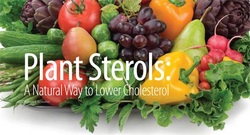 By Jenelle Croatto APD What are they? Plant sterols (phyto-sterols) are naturally occurring compounds found in a variety of plant foods that have a similar structure and function to that of cholesterol in humans. In a way, plant sterols are like ‘plant cholesterol’. This clever group of compounds limits the absorption of cholesterol from the digestive system. Did you know? Two-thirds of the cholesterol in our digestive system actually enters through bile (via the liver) and only one-third is from foods of animal origin! The biggest contributor to the blood level of cholesterol is saturated fat (animal fat) and not cholesterol. This is because the liver uses saturated fat to produce cholesterol, whereas, true dietary cholesterol is often found in smaller amounts within our food supply. How do plant sterols work? Cholesterol and other substances mix together during the digestion process to form a micelle – which are like tiny balls of molecules. Micelles act as cholesterol transporters through the intestine, where they deliver cholesterol to the intestinal wall for absorption into the blood. As plant sterols appear and act in the same way as cholesterol, they compete for a place within the micelle. There is a strong body of research to support that by consuming plant sterols you can reduce the amounts of cholesterol you absorb by 30-40%! The cholesterol that doesn’t make it into a micelle continues to pass out through the digestive tract. The research also shows that it is ‘bad’ serum LDL-cholesterol that is reduced and the ‘good’ serum HDL-cholesterol remains unaffected. How much should I have? An intake of 2-2.5g/day has shown on average to reduce serum LDL-cholesterol by 10% (in about 3 weeks). An intake higher than this does not provide any further benefit. It is near impossible to consume this amount from a diet that has not been enriched with sterols. Fortunately today there are many products that have been enriched with sterols and can easily be incorporated into your daily diet. Aim to have 2-3 serves of a sterol enriched product each day. One serve equate to: - 2 teaspoons of a sterol spread e.g. Flora Pro-Activ or Logicol - 1 tub of sterol containing yoghurt e.g. Jalna Proheart - 250ml (1 glass) of sterol containing milk e.g. HeartActive Some studies have shown that when consuming sterol enriched products there can be a decrease of carotenoids (precursor to vitamin A) and lycopene (antioxidant) in the blood. This can easily be managed by including an extra serve of carotenoid/lycopene rich fruits or vegetables each day e.g. those that are of a deep red or orange. One more thing... Apart from pregnant women and children, the only people who are not advised to consume plant sterols are those with the rare genetic disorder called homozygous sitosterolaemia. With this condition plants sterols are excessively absorbed from the gut, which can result in heart disease. It is also important to remember that plant sterols are not a one stop solution, nor a substitute for lipid-lowering medication. It is however, advisable to inform your medical practitioner if you are consuming plant sterols as you may require a reduction in your lipid-lowering medication. Plant sterols are useful when used adjunctively to a healthy diet, which is well balanced and is low in saturated fat.
0 Comments
|
News FEEDFitness, Energy, Education & Diet Archives
June 2020
Categories
All
|
 RSS Feed
RSS Feed